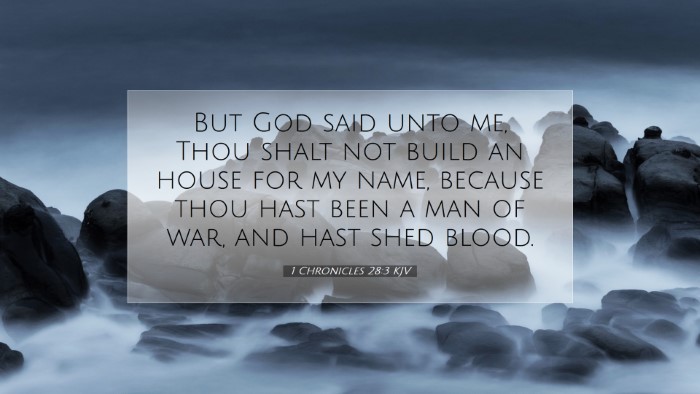Commentary on 1 Chronicles 28:3
Verse: "But God said to me, ‘You shall not build a house for my name, because you have been a man of war and have shed blood.’" (1 Chronicles 28:3)
Introduction
This verse marks a pivotal moment in the life of King David, highlighting God's divine plan and the significance of His will in the unfolding of Israel's history. In this commentary, we will explore the context of this verse, the implications of God's command to David, and the theological insights presented by various public domain commentaries.
Contextual Background
David's desire to build a temple for the Lord emerges from his deep sense of reverence and duty toward God. He recognizes the Ark of the Covenant's tent-like dwelling and feels compelled to construct a permanent sanctuary. The context of this desire sets the stage for God's response and David's subsequent actions.
Matthew Henry's Commentary Insights
Matthew Henry highlights several key points regarding this verse. He notes:
- God’s Sovereignty: David, even as a king, must submit to God's direction. The decision about the temple rests with God alone.
- The Reason for God's Denial: David's history as a warrior and the bloodshed associated with his reign precludes him from building the temple. This divinely appointed task is reserved for his son Solomon.
- Spiritual Considerations: David's heart was right in desiring to build a house for God, yet his past actions necessitated a different leader for this sacred task.
Albert Barnes' Commentary Insights
Albert Barnes offers additional reflections on this verse:
- Divine Communication: The declaration "God said to me" emphasizes the personal revelation and guidance God imparts to David. It is a reminder that God’s ways may not align with human desires.
- Nature of Leadership: Barnes reflects on the responsibility of leaders, noting that past actions have consequences which can limit future opportunities, even with the best intentions.
- Preparation for Next Generation: The transition of the temple-building task to Solomon signifies a generational blessing and continuity in leadership.
Adam Clarke's Commentary Insights
Adam Clarke adds further depth to our understanding:
- Understanding Bloodshed: Clarke elucidates that while David's military conquests were under God's guidance, the sanctity of the temple required a leader whose hands were clean of blood.
- God’s Holiness: The temple represents more than just a building; it symbolizes God’s Holy presence among His people. Thus, the one who builds it must embody that holiness.
- Ready and Willing Heart: Clarke asserts the importance of David's readiness to fulfill God's will despite personal disappointment, showcasing an essential characteristic of true leadership.
Theological Themes
Several theological themes arise from 1 Chronicles 28:3 that hold significance for contemporary readers:
- Divine Purpose versus Human Desire: The tension between David's desire to serve God and God's plan demonstrates that human intentions should align with divine purposes.
- Consequences of Sin and Leadership: Leaders must acknowledge the weight of their past and its impact on future service opportunities within God's kingdom.
- Transition and Legacy: The handoff of an important task highlights the importance of legacy and preparation of the next generation in ministries and church leadership.
Application for Modern Believers
As we reflect on 1 Chronicles 28:3, several applications emerge for modern believers, especially pastors and theologians:
- Seek God’s Will: Leaders must prioritize seeking God's direction over personal ambitions, recognizing His plans significantly supersede ours.
- Understanding Limitations: Acknowledge that there may be factors beyond one’s control that can limit roles within God’s calling, emphasizing humility and surrender to God's wisdom.
- Invest in the Next Generation: Mentoring and preparing those who will follow is critical, ensuring the continuity of God’s work through faithful discipleship.
Conclusion
1 Chronicles 28:3 serves as a profound reminder of God's sovereignty in guiding our paths and the responsibilities that come with leadership. David’s narrative illustrates that while ambition to serve God is commendable, ultimate obedience to His will is paramount. Through the insights of prominent biblical commentators, we glean wisdom applicable to both individual believers and church leaders today.


